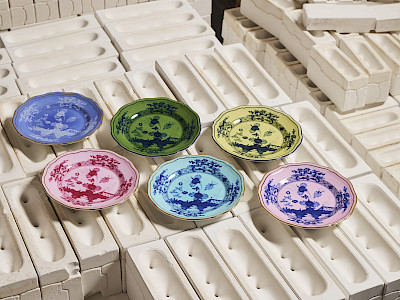You and I are happy witnesses to the revival of the most dear and pleasant tradition of ours. For the second year in a row, musicians from all over the country come to Shusha - the pearl of Karabakh, every inch of which stores the history of the past and the sprouts of the future - to celebrate the glorious, ancient "Khari Bulbul" festival. Do we still believe what we're seeing? To the fact that the homeland of countless poets, musicians and artists, which has been torn away from Azerbaijan for 30 years, looms again before our eyes? Where Molla Panah Vagif composed poems 250 years ago? Where 150 years ago Sadykhjan played on the tar? On the land where the Khari Bulbul festival was held 30 years ago?
The restoration of infrastructure and cultural heritage sites of the city, which was returned a year and a half ago, revived the atmosphere of this place. Walking along Shusha, it is impossible not to admire its historical wealth. The city has repeatedly become the site of various political clashes, numerous cultural and social outbursts, and thousands of secrets are still hidden in every stone.
The protection and development of the city in the cultural, political and tourism spheres have been in the spotlight since the 1960s, when the national leader Heydar Aliyev, even before the election, visited Shusha in the wake of the Karabakh conflict. The focus was on the improvement of the city and the need to restore the territories destroyed at the beginning of the twentieth century. In this direction, in the late 1970s, under the direct supervision of Heydar Aliyev, a number of important decisions were made. In 1977, the Council of Ministers of the Azerbaijan SSR declared Shusha a historical and architectural reserve.
In 2021, the President of Azerbaijan Ilham Aliyev declared Shusha the country's cultural capital, and also ordered to restore the historical appearance of the city and return the "pearl of Azerbaijan" to its former glory. This order breathed new life into the International Folk Festival "Khari Bulbul," held from 1989 to 1991.
When looking at the history of the festival, we will see that the reason for its holding was associated with the 100th anniversary of the hanende-singer Seyid Shushinsky. May was chosen, since at that time the orchid Ophrys caucasica blooms - a symbol and endemic of Karabakh, which gave the name to the festival.
The first festival gathered about 100 participants from six countries, and already in 1992 500 people from about 40 countries of the world were expected to participate. However, the burning war postponed the fourth festival for a long 29 years, until 2021, when Shusha was returned to the Azerbaijani people in the second Karabakh war.
The fifth "Khari Bulbul" festival, held on May 12-14, 2022 at the joint organization of the Ministry of Culture of Azerbaijan, the Heydar Aliyev Foundation and the Shusha City State Reserve was marked by a new approach, excellent weather, a wide presence of participants and audience. The opening ceremony of the festival was attended by President Ilham Aliyev, First Vice President Mehriban Aliyeva, as well as elected political, cultural and public figures of Azerbaijan.
The main goal of the festival was to present it as an event of international importance, and an additional demonstration that Karabakh is the land of Azerbaijan. The participation of guests from Western Europe, Africa, Central and South Asia shows the geographical scale of the festival.
At the same time, the Ministry of Culture does not forget about the creative approach: the fifth folk festival was remembered for its unusual, original synthesis of national ethnic genres of music with modern directions.
Pop folk ensemble "Jangi" from Azerbaijan and Egyptian singer Hamza Namira presented folk pop; participants from Mali and Tunisia, Arslan Novrasli, Gochag Askerov performed folk jazz; and the Ahmedowsky trio band even combined mugham with neo-funk. Etibar Asadli's group and members from Bulgaria also used modern electronic instruments.
The dance performances of the festival were highlighted by Azerbaijani and Turkish dance ensembles, Colors of Pakistan, Uzbek Baxor and Georgian Melitassi.
The opening of the festival began with the "Patriotic Suite" performed by the Azerbaijan State Song and Dance Ensemble named after Fikret Amirov and ended with a fragile, heartbreaking song "Vətəndən pay olmayır" performed by Honored Artist of Azerbaijan Aybeniz Hashimova and the Bülbüllar band. One of the selected musical numbers of the first day, "Qarabağ şikəstəsi", constantly included in the program of the "Khari Bulbul" festivals, was performed by honored artists Ilkin Akhmedov, Babek Niftaliyev and Sabina Arabli.
People's Artist of Azerbaijan Polad Bulbuloglu became one of the honorary participants of the festival. Also among the special guests were Honored Artist Shirzad Fataliyev, the "Khari Bulbul" ensemble, as well as ashugs Samira Aliyeva and Ali Tapdigoghlu.
On the second day of the festival on the Jidir Plain, Hanende Gochag Askerov and the ethno-jazz group of Tarist Arslan Novrasli made a joint performance of the compositions Bayatı-Kürd and Şur. On the stage in front of the bust of Uzeyir Hajibeyov, pianist Etibar Asadli played ethno-jazz pieces of his own composition Salam, Sarı gəlin, Jamming mugham, etc.
The third and last day of the festival began with performances by folklore collectives from the regions of Azerbaijan. The concert program included the names of musicians from Masalli, Saatli, Ismayilli, Balakan and Zakatala.
The final concert of the festival began with a fascinating performance of the Azerbaijan State Dance Ensemble under the direction of People's Artist of the country Rufat Khalilzade. Professional dancers who performed with excellent dance productions based on the dances "Gazagi", "Gaitagi", "Bahar" shared the stage with their colleagues from Turkey and Georgia.
And at the end of the concert, all participants and spectators joined one of the oldest Azerbaijani dances "Yalli".
This is how the fifth “Khari Bulbul” festival finished - with great success, love and pride of all those gathered on the same plain.



